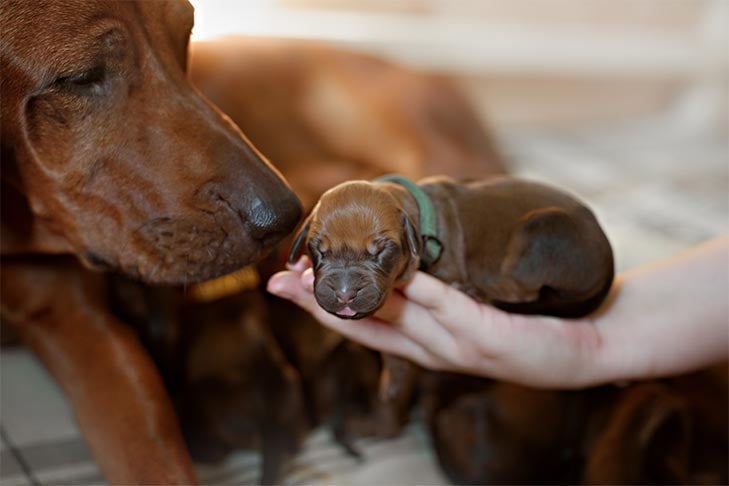
Most of us put our all into producing fabulous puppies. We select breeding stock with care, emphasizing things like health clearances and temperament. We raise our pups in enriched pens and feed the best nutrition we can to sires, dams and pups.
Yet we may be overlooking the importance of a key period in puppy development. The Perinatal period, from conception until just after birth, is a time when puppies undergo dramatic neural and immune development. In fact, this period sets the stage for every dog’s lifetime health, mental stability, and longevity. Here are three of the more fascinating perinatal effects.
Parents’ Age, Younger Is Not Better
Historically, dog breeders have bred their dogs young and retired them early, especially bitches. Given that young dogs are typically more fertile than older ones, this plan made sense. However, if longevity is one of our breeding goals, recent research into telomeres might make us reconsider this strategy.
Telomeres are the “safety caps” on the end of each chromosome that protect important genetic material from being lost or damaged during normal cell division. The longer a dog’s telomeres, the more likely the dog will live a long life.
What determines the length of a puppy’s telomeres? First and foremost, its parents. Dams typically pass on the telomere length they got from their moms so dams from lines with good longevity are likely to produce pups with longer telomeres.
Sire telomeres are more complicated. Unlike those in eggs, sperm telomeres tend to lengthen over a dog’s lifetime. Therefore, sperm produced later in a dog’s life are more likely to have longer telomeres than sperm produced by the same dog in its youth. Obviously, we have to balance the quality of the semen and telomere length but if longevity is one of our goals, breeding bitches from long-lived pedigrees to older dogs may stack the deck in our pups’ favor.

More Prenatal Enrichment and Less Distress
Pregnant dams can face two types of stress: negative or distress, and positive or eustress. Both types of prenatal stress have long-term effects on puppies. Pups whose dams experience distress during pregnancy are more likely to be reactive, anxious and irritable as adults, with dysfunctional stress management systems, lower intelligence, and shorter attention spans. Conversely, puppies whose dams have enriched pregnancies are more likely to be calmer and more stable adults, that learn, breed, and digest better.
How can we tell which kind of stress our bitches are experiencing? Since stress must be viewed through the dog’s eyes, distress comes from things she finds frightening, unpleasant or painful, and enrichment from activities, situations and people she enjoys. The same activity, say showing, might cause distress and eustress in two different bitches. As a result, it is very important for us to know our girls well and fill their lives with enrichment while they are pregnant so their adult offspring are healthier and more stable.
Good Mothers Are Essential
Finally, let’s talk mothering. In the hours and early days after birth, the amount of licking, nuzzling, poking and touching from their mom has long-term, often lifetime, impact on pups’ behavior. Pups from good mothers are less likely to be anxious and aggressive in adulthood, more resilient and trainable, and are able to learn better under stress. In addition, high quality mothering in other mammals has been linked to changes in DNA so its benefits get passed on to future generations. Good mothers tend to beget good mothers and through them, more stable, trainable dogs.
This should encourage us to select our breeding stock for their mothering abilities and then allow dams to be present with their pups as much as possible during the early weeks. If we have to take over that role, we must focus on more than feeding and cleaning, and instead provide stimulation of the puppy’s entire body, especially its groin, anus and abdomen, throughout each day.
So to produce better dogs, we must start even younger than we thought. Taking these three simple actions during the Perinatal period will help us all produce healthier, longer lived, more stable dogs.

About the author: Gayle Watkins, Ph.D. is a Breeder of Merit of Golden Retrievers and founder of Avidog. Gayle is a retired Army Colonel and currently serves on the boards of Cornell’s Baker Institute for Animal Health and Canine Health Events.

